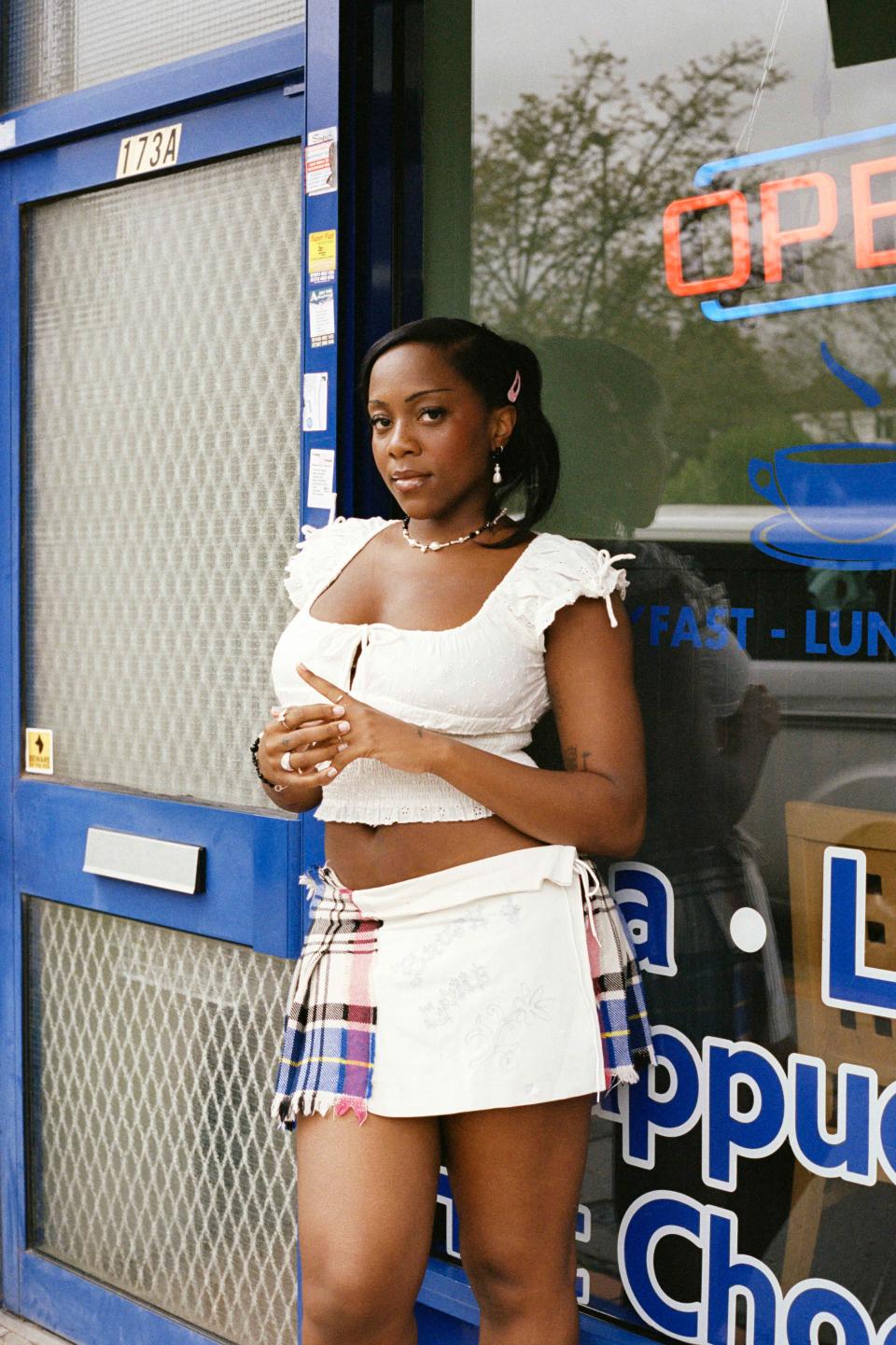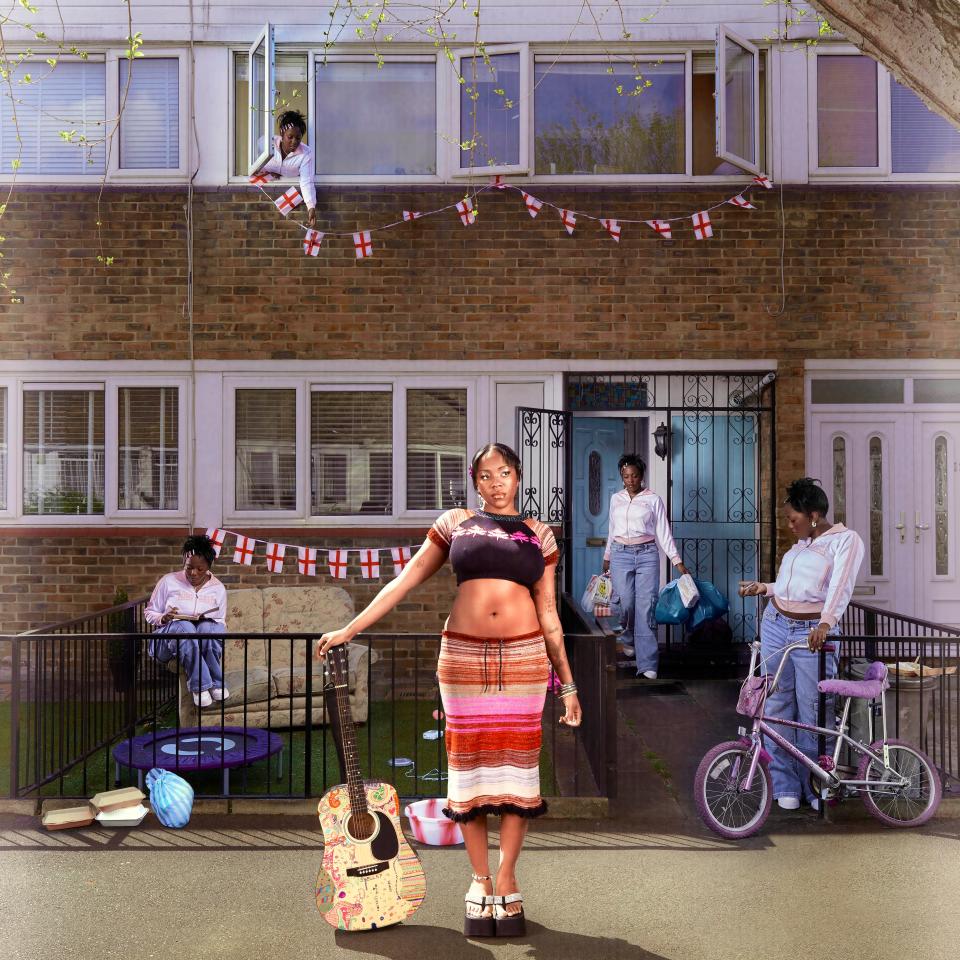Rachel Chinouriri Explores Love, Trauma on Debut Album What a Devastating Turn of Events : Interview

Lauren Harris
Rachel Chinouriri performs like a divine messenger, dispensing advice with a caressing, heavenly touch. On the last night of two sold-out shows at Brooklyn venue Baby’s All Right in early March, she started her set with “Garden Of Eden,” the misty, opening track off her debut album What a Devastating Turn of Events, out May 3rd via Parlophone. Her eyes drifted upwards with a curious gaze, as if she was sending her music outwards, beyond the confines of the small stage. When she did turn towards us, singing directly into the bustling, ecstatic crowd, we listened and shouted along with rapt attention to the stories she told, tragic as they occasionally were.
When I reminisce about the night with Chinouriri a week later over Zoom, she breaks out into a huge grin, miming the excitement of her “Darlings” — her fandom named after the 2018 single that kickstarted her career four years later. On the night of her first New York show, she had just flown in from the U.K. and jet lag was setting in, but the exhaustion faded as she walked onto the stage of her first U.S. tour to rapturous screams: “I could feel the love,” she tells Teen Vogue. “It was really wholesome and what I needed.” She’s calling from L.A., a day before she finishes her stay in the States with another sold-out performance at The Echo. It’s a short, jam-packed tour, but one that holds special meaning for Chinouriri as she prepares to release the most important project of her career thus far: “Being busy doing the dream that I’ve always wanted to do, in the job that I was born to do, is really nice,” she smiles.
There was a time when Chinouriri’s dream was a bit hazier. Born to Zimbabwean immigrant parents in Kingston, and growing up in Croydon, South London in a quiet, woodsy suburban area, she gravitated towards music as a cure for her perennial boredom, playing piano and guitar, singing along to music on YouTube. At 16, considering either a career in music or criminal psychology, she applied to the prestigious performing-arts college The BRIT School — home to famous alumni like Adele, Amy Winehouse, and Raye — as a way to guide her to a decision. “If I didn’t get into that college, I was never going to pursue music again,” she says adamantly. She was accepted, though Chinouriri concedes that whichever path she chose might have always taken her to now. “Deep down, I always wanted to be [a musician], whether I got into the school or not.” she demurs. “But I didn’t know how to be one. Because the music I liked, the music I wanted to make, [I wasn’t] seeing women who looked like me at the superstar level.”
BRIT School provided Chinouriri with knowledge and a toolset to test her musical capabilities, but her songwriting talent has proven to be the most galvanizing force to her success. Her first EP in 2016, Bedroom Tales, was a scrappy bedroom-pop SoundCloud project made on a £20 microphone and Garageband. Chinouriri’s mournful melodies, paired over plucked guitar squeaks and dusty vocals, are a far cry from the radiant pop belters she’s released recently, but like all her best songs, they spark a burgeoning need to feel something.
Perhaps the best example of how that spark filters out from Chinouriri’s heart into the wider world is through her gorgeous love ballad, “So My Darling.” Originally released as a single in 2018, she wrote it for an unrequited crush (who remains a close friend), and bookended the song with voice notes from friends professing their love for others. The soft lilt of her voice is somber and the song’s acoustics are ghostly, but the core of “So My Darling” is the act of loving forever, and being forever loved: “Remember I’ll always love you,” she hums in one of the track’s best folksy riffs. So there’s perhaps no real explanation needed as for why the song went viral on TikTok four years later.
“That song was my saving grace,” Chinouriri reflects. The track’s message wasn’t just affirming for old and new fans, but clarified her own sonic purpose. At the time, she had just released a moodier, electro-R&B EP called Four° in Winter, a big shift-change from the lighter, poppier tones of “So My Darling” and her 2019 EP, Mama’s Boy. Chinouriri — who counts pop-rock and folk artists like Coldplay and Daughter among her influences — had been growing frustrated with the way her music was categorized: clear alt-rock and indie-pop tunes were being labeled as R&B and Soul by press and streaming playlists.
“Looking back at [Four° in Winter], it was probably a reflection of where my head was at,” she recounts. “I think that project is brilliant, and it’s one of my favorites. But I also know what happens when Black artists get pigeonholed into one thing, and I could already feel myself being pigeonholed,” she recounts. After its release, she noticed that her streaming numbers were increasing, and the music was getting playlisted correctly. “I just had this internal battle of, if this is doing well, then maybe I just try to evolve this version of me,” she notes. But when the stripped-down, acoustic version of “So My Darling” blew up, she took it as a welcome sign from the powers that be: “My brain had an ‘aha’ moment of, this is literally the universe being like, ‘no, go back to your core values!’”

Listening to What a Devastating Turn of Events, Chinouriri’s true authenticity shines blindingly bright. Stadium pop-rock bangers like lead single “Never Need Me” and “Cold Call” propel you forward with heavy emotion, while funkier grooves in “It Is What It Is” and “Dumb Bitch Juice” offer some (un)gracious levity and humor to devastating heartbreak: “I know what you’re like/Hot and cold/Hit and miss/Up and down and a bit of a prick really,” she laughs spitefully on the former.
Chinouriri is also an excellent storyteller, and midway through the record, it becomes clear that there’s more to her writing than just romantic heartbreak. On the album’s title track, with a relaxed, ‘90s-hip-hop bounce, she narrates the true, tragic story about a cousin who died by suicide after becoming pregnant out of wedlock. The shock of its story, along with its dissonant soundscape and no-chorus structure, adds an uneasy, natural horror; Chinouriri notes that it's a sonic reflection of how her own family reacted to the news. “I think it’s a really important story to be told,” she says. “There’s a false sense of security that you have listening to the song, and then it completely flips by the end, to the point where it’s almost awkward.”

That draw to speak truthfully is reflected through all aspects of Chinouriri’s life, not just music. While her state-side tour was supposed to coincide with a stop at the South by Southwest (SXSW) festival in Austin, TX, a few days before her scheduled performance, she publicly dropped out, citing the festival’s sponsorship by the U.S. Army as the reason. “On a personal level, [performing there] would have just been too triggering. But even on a moral level, you don’t have to be personally affected by something to have sympathy or empathy.”
Both her parents were teenage soldiers in the Rhodesian Bush War, she says, which eventually led to decolonization, and the creation of modern, independent Zimbabwe, and she understands how the effects of war and violence linger in destabilizing ways for all involved. “I was raised in essentially a military family,” she explains, noting the ways in which traces of that war stayed with her parents years after they left it: through strict parenting, excessive drinking, and a severe brain injury. “It’s shaped their lives so much,” she continues. “There’s a sense of pride and real toughness from being a soldier…but I think the trauma that it leaves — no matter what the outcome is — from war is one of the worst things I’ve been able to witness firsthand.”
Her statement that week was one of dozens by other artists originally scheduled to perform at SXSW, who chose to drop out in protest of the U.S. government’s support of Israel’s ongoing incursion in the Gaza Strip, which has reportedly killed as many as 34,000 Palestinians. (SXSW, in a statement on Twitter, said that “The Army’s sponsorship is part of our commitment to bring forward ideas that shape our world,” and that the organization “will continue to support human rights for all.”) “I think that there should be an immediate ceasefire with what’s going on in Gaza,” she affirmed. “It’s a privilege to be sat in this position where all I have to do is say that and boycott something, versus the people who are actually going through such troublesome times, going through a lot of trauma and death and violence and fear.”
The back half of What a Devastating Turn of Events carries that darker tone introduced in the title track, detailing instances of self-harm and negative intrusive thoughts, as on “My Blood” and “I Hate Myself.” But I’m most drawn to the album’s penultimate track, the soft, acoustic “Pocket,” where Rachel Chinouriri sings with a whispered, hopeful lilt: “I know you’ve gone through hell/I’ve pulled you through somehow/But you don’t know that I can’t do a thing without your help.” The message, whether directed to a hurting friend or your own pained self, is community-centered. “Trauma can definitely make or break some people,” she explains. “But the thing is, I want people to feel like their trauma doesn’t have to break them.”
Originally Appeared on Teen Vogue
Want more great Culture stories from Teen Vogue? Check these out:
A New Generation of Pretty Little Liars Takes on the Horrors of Being a Teenage Girl
Underneath Chappell Roan’s Hannah Montana Wig? A Pop Star for the Ages
Donald Glover’s Swarm Is Another Piece of Fandom Media That Dehumanizes Black Women
On Velma, Mindy Kaling, and Whether Brown Girls Can Ever Like Ourselves on TV
Gaten Matarazzo Talks Spoilers, Dustin Henderson, and Growing Up on Stranger Things
How K-pop Stars Are Leading Mental Health Conversations for AAPI People and Beyond
Meet the Collective of Philly TikTokers Making You Shake Your Hips
The Midnight Club Star Ruth Codd Isn’t Defined By Her Disability


